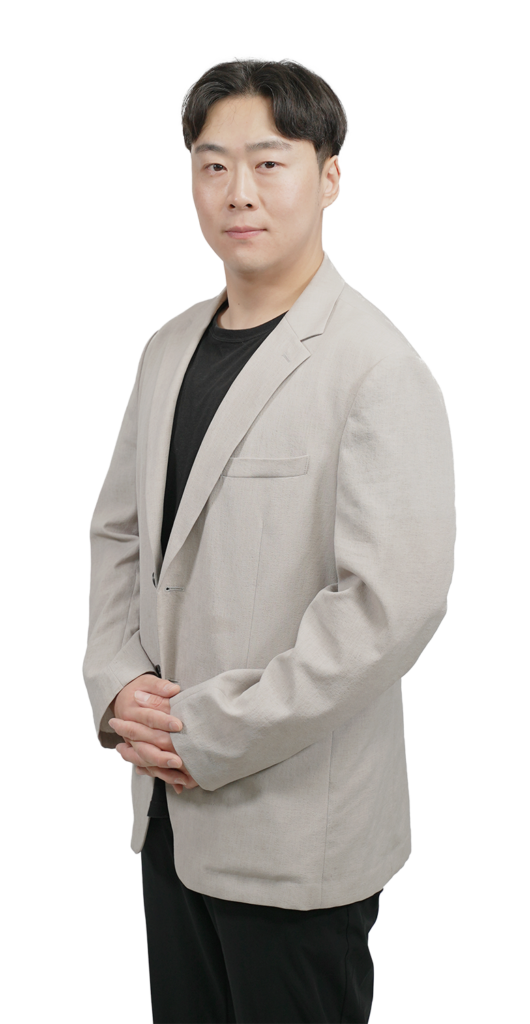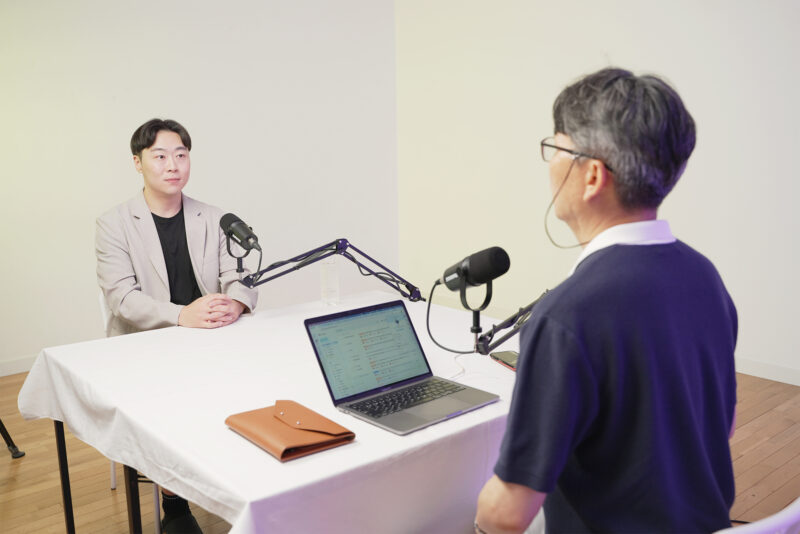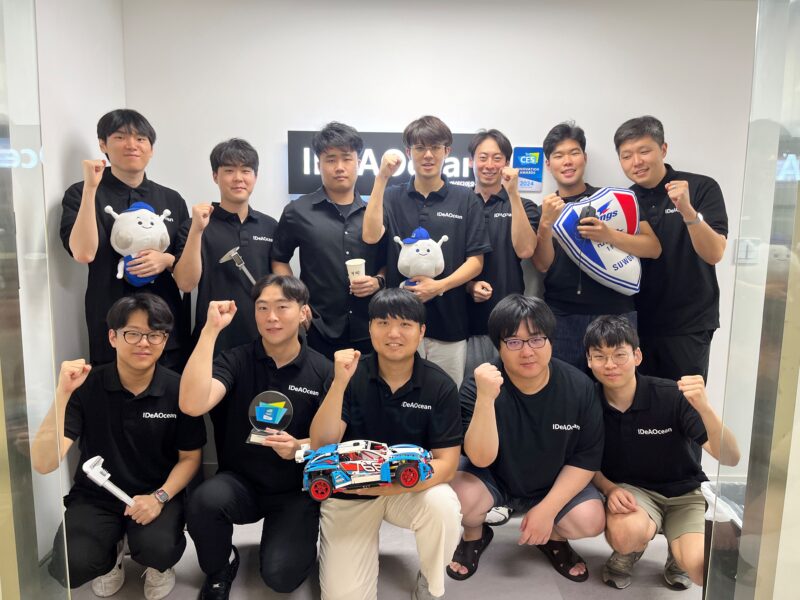- funding Stage : Pre-Series A
- Raising Amount : KRW 1.5 B
- Desired Fundraising Timeframe : 4Q 2024 ~ 1Q 2025
When we think of “mechanism,” we often imagine how something works or the order in which a task is carried out. However, in robotics or machines, a mechanism refers to the actual system of components that produce movement. For example, in the case of a robot, the mechanism includes actuators, gears, motors, sensors, and connectors that move or manipulate objects and perform tasks. Properly designing these mechanisms is essential to creating cost-effective robots and machines.
This brings us to “IDeA Ocean,” a startup that develops software to autonomously design the mechanisms for robots, mobility devices, and other machinery. The company also manufactures and sells hardware modules based on these designs. IDeA Ocean was founded in July 2023 by Dr. Joongho Kim, who holds a PhD in mechanical engineering from Seoul National University (SNU).
Their flagship product is called “METHEUS,” a software solution designed for autonomous mechanism design. The name METHEUS evokes the Greek mythological figures Prometheus and Epimetheus—meaning “the one who thinks ahead” and “the one who thinks later,” respectively. So, we can interpret METHEUS as “the software that thinks for itself,” aligning perfectly with its purpose and showcasing the company’s pride in their innovation.

For engineers, designing mechanisms is a time-consuming and expensive process. Each robot or machine requires a unique design, making the process even more tedious. IDeA Ocean’s METHEUS addresses this by drastically reducing the time spent on mechanism design, saving both time and cost.
Another key advantage of METHEUS is its ability to create “right-sized” specifications. According to CEO Joongho Kim, many robots used in industries like F&B are often over-engineered with unnecessary specs for the tasks they perform. For instance, serial robots used for tasks like coffee blending or frying chicken are often equipped with too many joints, actuators, and motors that deliver more power than necessary. METHEUS helps design optimal robots without such excess, leading to significant cost savings.
Joongho Kim’s journey to founding IDeA Ocean started during his PhD studies at SNU. There, he advanced a self-designing mechanism technology based on the Stem Bar/Block Mechanism (SBM), initially developed by his mentor, Professor Yoon-Young Kim. His work received high praise after being published in international journals, inspiring him to start the company. Today, IDeA Ocean’s team mainly consists of graduates from SNU and Hanyang University, all of whom share Kim’s vision and enthusiasm.
Kim describes METHEUS as a “generative AI for design,” distinguishing it from other AI tools. Once specific parameters are set, METHEUS can autonomously generate designs. The company has already signed an NDA with a major Korean corporation to test if METHEUS can be applied to mass-produced robots. Despite being a young company founded just last year, IDeA Ocean has secured contracts worth 300 million KRW in 2023 alone. If ongoing tests with these large companies are successful, METHEUS is expected to launch officially in 2026 after further development.
IDeA Ocean has achieved considerable milestones since its founding and is now looking to raise 1.5 billion KRW in pre-series A funding. The team hopes that investors will recognize the potential of their self-thinking software, METHEUS, and support the company’s continued success.

What problems is IDeA Ocean trying to solve?
The first issue we aim to tackle is the inefficiency engineers face when designing mechanisms for robots, mobility devices, or general machinery. A mechanism, composed of motors, links, joints, and more, is the key element responsible for movement in machines. Designing such complex structures is often time-consuming and resource-intensive.
The second problem involves the high costs associated with over-engineered, non-specialized robots. Robot prices are largely determined by the number of motors and their power. Over-designing robots with excessive components leads to unnecessary expenses. Our goal is to create cost-effective robots optimized for their specific tasks, using just the right amount of motors and power.
How is IDeA Ocean addressing these issues?
IDeA Ocean is a startup specializing in autonomous design technology, allowing mechanisms to be designed without a starting layout. Our key product, METHEUS, is a generative mechanism design software that revolutionizes the way engineers approach mechanism design, making the process faster and more creative.
Our mechanism design technology, based on a black-box approach, doesn’t rely on human intuition or experience. Instead, it uses innovative algorithms to generate optimal designs. This technology, developed at the IDeA Lab at SNU, employs the Stem Bar/Block Mechanism (SBM) for modeling, which we combine with AI and big data to assist engineers in efficiently designing mechanisms.
METHEUS addresses the first problem by drastically reducing the time spent on design. The second issue is solved through the development of customized robot hardware modules. By using METHEUS to design task-specific robots, we eliminate the need for over-specification and deliver optimal solutions that are both high-performing and cost-effective.

What makes us stand out from competitors?
Our competitive edge lies in our core autonomous design technology. It’s no exaggeration to say IDeA Ocean is a global leader in this field. CEO Joongho Kim, who completed his PhD specializing in this technology, leads the company, with technical guidance from Professor Yoon-Young Kim, the original developer of this innovation. Our team is composed of top-tier engineers from SNU and Hanyang University, who are accelerating the development of this cutting-edge technology.
While there are other software tools that generate mechanisms, most are limited to basic two-dimensional designs and struggle to handle complex mechanisms. Even academic efforts to combine AI with mechanism design have hit roadblocks, such as the non-linear nature of real-world engineering.
In contrast, IDeA Ocean has developed METHEUS based on SBM, combining big data with AI. We are continuously filing patents related to this technology, further solidifying our competitive advantage.
Additionally, we are not just focused on software. We are developing hardware modules alongside METHEUS. Unlike most design tools that merely generate digital layouts, our hardware modules are based on real-world data, integrating motor, link, and bearing information to create practical, functional robots.
What products does IDeA Ocean offer?
We have three major services in development. The first is our engineering solution, where we use our autonomous design technology to create mechanisms tailored to client needs. The second is METHEUS, our generative mechanism design software, set to launch officially in 2026. The third is a line of modular robot hardware based on METHEUS-generated designs.

Currently, we are offering our engineering solutions to several domestic clients in the automotive and heavy industry sectors. We help these companies design the best possible mechanisms to meet their evolving needs. While this involves manual coding and support at present, METHEUS is being developed to automate these tasks in the near future.
We are also actively working on our modular hardware, with plans to conduct Proof of Concept (PoC) trials with potential clients soon.
How large is your target market, and who are your key customers?
The target market for METHEUS spans the mobility, robotics, and mechanical CAD/3D modeling software sectors. This market is expected to grow from 25 trillion KRW in 2024 to 40 trillion KRW by 2029.
Our primary customers are large companies in mobility and robotics, which require fast, creative design solutions to keep up with new trends like electrification and autonomous driving. METHEUS will support these companies by providing compatibility with existing CAD tools, giving them a significant competitive edge.
For our hardware modules, the target is the service robot market, which is projected to grow from 47 trillion KRW in 2021 to 189 trillion KRW by 2027. Our focus here is on companies that use robots for simple, repetitive tasks and need cost-effective, specialized solutions.
What is your business model?
We have two main business models.
First, in software, we plan to generate licensing revenue from METHEUS. We’ll offer this generative design tool to engineers worldwide in sectors like mobility, robotics, and machinery. By offering both our engineering solutions and METHEUS licenses, we’ll expand our customer base and revenue streams.
Second, in hardware, we will generate revenue from modular robot components. METHEUS will provide design data optimized for both performance and cost, allowing customers to easily acquire hardware modules tailored to their specific needs. Even for clients who don’t use METHEUS, we plan to offer rapid design and delivery of customized modules through partnerships with robot integrators and manufacturers.

What has IDeA Ocean achieved so far?
Since our founding, we’ve accomplished a lot. In May 2023, we were selected for the Pre-Startup Package, followed by a partnership with Seoul National University for the Laboratory-Based Startup Initiative in July. We secured seed funding from a top-tier accelerator in August.
By September, we had established a corporate research institute and earned Venture Business certification, and in October, we were awarded 500 million KRW through the TIPS program. We also received several accolades, including Honoree recognition at the CES 2024 Innovation Awards.
In 2024, we filed patents for our mechanism design methods and won several prestigious awards, including from the Korea Commercialization Promotion Agency. Our annual revenue is expected to grow from 25 million KRW last year to 300 million KRW this year, demonstrating rapid growth.
What makes the IDeA Ocean team strong?
Our strength lies in our people. CEO Joongho Kim, who specialized in autonomous design, leads the team, supported by experienced engineers from top universities like SNU and Hanyang. Our technical advisor, Professor Yoon-Young Kim, is the original developer of the SBM model, and our broader team includes skilled engineers who have previously worked in major global companies.
We are also committed to hiring new talent by collaborating with universities and research institutions, ensuring that we continue to grow and innovate as a team.

Why should investors support IDeA Ocean?
If you’re looking to invest in a company with groundbreaking technology and significant market potential, IDeA Ocean is the one to watch. Here’s why:
Potential for M&A: METHEUS is built to attract global CAD companies. In fact, we’ve already had discussions with leading players in the CAD space who are interested in our unique features.
IPO Strategy: By combining both software and hardware strengths, we aim for a successful IPO. We plan to target the AI and robotics sectors, offering innovative solutions that are in high demand.
World-Leading Technology: Our autonomous design technology is the first of its kind, and we believe it will disrupt the mobility and robotics design markets. We’re continuously filing patents to protect and expand our technology. Investing in us now means being part of the future of mechanism design.
MORE FROM THE POST
- [Korean Startup Interview] From Text to CAD: How Herewe’s EaseAI Is Revolutionizing Product Design
- [Korean Startup Interview]MAZE: “Developing Vision AI to Remember Human Personas, Aiming to Lead Global Offline CRM”
- [Korean Startup Interview] BeringLab: “Expanding Globally with Specialized AI Translation for Law, Patents, and Clinical Fields”
- [Korean Startup Interview] Deepvisions: Revolutionizing Air Pollution Monitoring with AI-Powered Vision Technology
- [Korean Startup Interview] IPIN LABS, “Challenging the Global Market with Strong Indoor Positioning Technology”
- Design
- EN
- generative AI
- IDeA Ocean
- Interview
- Korea
- Korean startup
- mechanism
- METHEUS
- robotics
- wow together
- WOWTALK
Share
Most Read
- 1
- 2
- 3
- 4
- 5



Leave a Reply